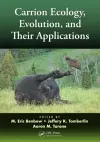
Carrion Ecology, Evolution, and Their Applications
3 contributors - Hardback
£180.00
Dr. M. Eric Benbow is an Assistant Professor in the Departments of Entomology and Osteopathic Medical Specialties at Michigan State University. The research in his lab focuses on microbial-invertebrate community interactions in aquatic ecosystems, disease systems and carrion ecology and evolution. All of these research foci use basic science to inform applications in areas such as human health, natural resources management and forensics. Dr. Benbow has authored or co-authored a collection of over 100 peer-reviewed papers, book chapters, and proceedings, many of which relate to carrion decomposition ecology. He has served on a National Research Council committee related to aquatic ecology, and is regularly invited as a speaker at international and national academic meetings related to aquatic, disease and decomposition ecology. Dr. Benbow has led workshops at the international level discussing experimental design, statistical analyses and the importance of novel basic ecological concepts in advancing the field of carrion ecology and applications in forensics. Dr. Benbow was part of the inaugural executive committee for the North American Forensic Entomology Association (NAFEA) where he served as the Editor-in-Chief of the annual NAFEA Newsletter and NAFEA Webmaster (www.nafea.net) for eight years. He was the president of NAFEA from 2012-2013 and has served as an expert witness and worked on several cases that involved insects as evidence during investigations or water resource litigation. He continues a recognized research program in microbe-insect interactions that supports undergraduate and graduate students and postdoctoral associates. Dr. Benbow continues to mentor and co-mentor students and postdoctoral associates through research and teaching. He sees the future of ecology and evolution to fundamentally be in the hands of students and early scientists worldwide.
Dr. Jeffery K. Tomberlin is an associate professor and co-director of the Forensic & Investigative Sciences Program and principal investigator of the Forensic Laboratory for Investigative Entomological Sciences (FLIES) facility (forensicentomology.tamu.edu) in the Department of Entomology at Texas A&M University. Research in the FLIES facility examines species interactions on ephemeral resources such as vertebrate carrion, decomposing plant material, and animal wastes to better understand the mechanisms regulating arthropod behavior related to arrival, colonization, and succession patterns. The goals of his program are to refine current methods used by entomologists in forensic investigations. His research is also focused on waste management in confined animal facilities and the production of alternate protein sources for use as livestock, poultry, and aquaculture feed. Since arriving on campus at Texas A&M University in 2007, six PhD and eight MS students have completed their degrees under his supervision. Dr. Tomberlin welcomes those who are interested in collaborating or gaining experience in forensic entomology or other areas of his research to visit the FLIES facility. Dr. Tomberlin has been very active within the forensic science community. He, along with a colleague, initiated the first forensic entomology conference in North America as well as the formation of the North America Forensic Entomology Association, of which he served as the first president. He is also a Fellow in the American Academy of Forensic Sciences and has served as the chair of the Pathology/Biology Section. Dr. Tomberlin is also one of the 17 entomologists who are board certified by the American Board of Forensic Entomology (ABFE). He has served several roles within the ABFE including secretary and chair.
Dr. Aaron M. Tarone is an assistant professor in the Department of Entomology at Texas A&M University. He teaches in the in the Forensic & Investigative Sciences Program housed in that Department and is part of the Texas A&M University Ecology and Evolutionary Biology Doctoral Program. Dr. Tarone is a member of the Genetics Society of America, the Entomological Society of America, and the North American Forensic Entomology Association. Research in his laboratory is centered on genetic studies of development time and body size both in model organisms like Drosophila melanogaster and in carrion feeding blow flies. Dr. Tarone has also been a leader in developing genomic tools for non-model organisms, including carrion feeding insects. He has been involved in genomic projects related to carrion biology that have been funded by Texas A&M University and the National Institute of Justice and he assisted in the annotation of the Tsetse genome. He hopes to use knowledge gained from his research to increase the accuracy and precision of estimates of insect age in forensic investigations while simultaneously furthering basic knowledge in the evolutionary ecology of carrion systems.